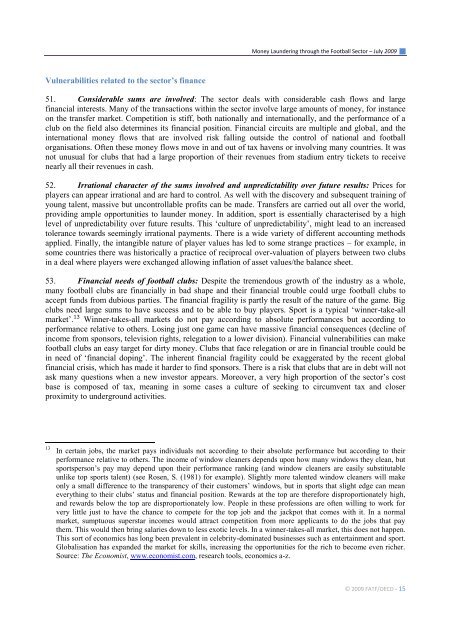Money Laundering through the Football Sector
Money Laundering through the Football Sector
Money Laundering through the Football Sector
Create successful ePaper yourself
Turn your PDF publications into a flip-book with our unique Google optimized e-Paper software.
Vulnerabilities related to <strong>the</strong> sector’s finance<br />
<strong>Money</strong> <strong>Laundering</strong> <strong>through</strong> <strong>the</strong> <strong>Football</strong> <strong>Sector</strong> – July 2009 <br />
51. Considerable sums are involved: The sector deals with considerable cash flows and large<br />
financial interests. Many of <strong>the</strong> transactions within <strong>the</strong> sector involve large amounts of money, for instance<br />
on <strong>the</strong> transfer market. Competition is stiff, both nationally and internationally, and <strong>the</strong> performance of a<br />
club on <strong>the</strong> field also determines its financial position. Financial circuits are multiple and global, and <strong>the</strong><br />
international money flows that are involved risk falling outside <strong>the</strong> control of national and football<br />
organisations. Often <strong>the</strong>se money flows move in and out of tax havens or involving many countries. It was<br />
not unusual for clubs that had a large proportion of <strong>the</strong>ir revenues from stadium entry tickets to receive<br />
nearly all <strong>the</strong>ir revenues in cash.<br />
52. Irrational character of <strong>the</strong> sums involved and unpredictability over future results: Prices for<br />
players can appear irrational and are hard to control. As well with <strong>the</strong> discovery and subsequent training of<br />
young talent, massive but uncontrollable profits can be made. Transfers are carried out all over <strong>the</strong> world,<br />
providing ample opportunities to launder money. In addition, sport is essentially characterised by a high<br />
level of unpredictability over future results. This „culture of unpredictability‟, might lead to an increased<br />
tolerance towards seemingly irrational payments. There is a wide variety of different accounting methods<br />
applied. Finally, <strong>the</strong> intangible nature of player values has led to some strange practices – for example, in<br />
some countries <strong>the</strong>re was historically a practice of reciprocal over-valuation of players between two clubs<br />
in a deal where players were exchanged allowing inflation of asset values/<strong>the</strong> balance sheet.<br />
53. Financial needs of football clubs: Despite <strong>the</strong> tremendous growth of <strong>the</strong> industry as a whole,<br />
many football clubs are financially in bad shape and <strong>the</strong>ir financial trouble could urge football clubs to<br />
accept funds from dubious parties. The financial fragility is partly <strong>the</strong> result of <strong>the</strong> nature of <strong>the</strong> game. Big<br />
clubs need large sums to have success and to be able to buy players. Sport is a typical „winner-take-all<br />
market‟. 13 Winner-takes-all markets do not pay according to absolute performances but according to<br />
performance relative to o<strong>the</strong>rs. Losing just one game can have massive financial consequences (decline of<br />
income from sponsors, television rights, relegation to a lower division). Financial vulnerabilities can make<br />
football clubs an easy target for dirty money. Clubs that face relegation or are in financial trouble could be<br />
in need of „financial doping‟. The inherent financial fragility could be exaggerated by <strong>the</strong> recent global<br />
financial crisis, which has made it harder to find sponsors. There is a risk that clubs that are in debt will not<br />
ask many questions when a new investor appears. Moreover, a very high proportion of <strong>the</strong> sector‟s cost<br />
base is composed of tax, meaning in some cases a culture of seeking to circumvent tax and closer<br />
proximity to underground activities.<br />
13 In certain jobs, <strong>the</strong> market pays individuals not according to <strong>the</strong>ir absolute performance but according to <strong>the</strong>ir<br />
performance relative to o<strong>the</strong>rs. The income of window cleaners depends upon how many windows <strong>the</strong>y clean, but<br />
sportsperson‟s pay may depend upon <strong>the</strong>ir performance ranking (and window cleaners are easily substitutable<br />
unlike top sports talent) (see Rosen, S. (1981) for example). Slightly more talented window cleaners will make<br />
only a small difference to <strong>the</strong> transparency of <strong>the</strong>ir customers‟ windows, but in sports that slight edge can mean<br />
everything to <strong>the</strong>ir clubs‟ status and financial position. Rewards at <strong>the</strong> top are <strong>the</strong>refore disproportionately high,<br />
and rewards below <strong>the</strong> top are disproportionately low. People in <strong>the</strong>se professions are often willing to work for<br />
very little just to have <strong>the</strong> chance to compete for <strong>the</strong> top job and <strong>the</strong> jackpot that comes with it. In a normal<br />
market, sumptuous superstar incomes would attract competition from more applicants to do <strong>the</strong> jobs that pay<br />
<strong>the</strong>m. This would <strong>the</strong>n bring salaries down to less exotic levels. In a winner-takes-all market, this does not happen.<br />
This sort of economics has long been prevalent in celebrity-dominated businesses such as entertainment and sport.<br />
Globalisation has expanded <strong>the</strong> market for skills, increasing <strong>the</strong> opportunities for <strong>the</strong> rich to become even richer.<br />
Source: The Economist, www.economist.com, research tools, economics a-z.<br />
© 2009 FATF/OECD - 15


